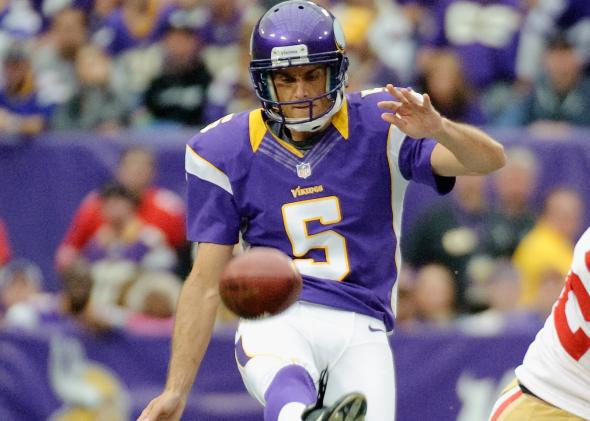Former NFL punter Chris Kluwe published a scathing account on Deadspin on Thursday alleging homophobia within the Minnesota Vikings administration. Kluwe, who is heterosexual, claims that his outspoken advocacy for gay rights had more to do with his firing than his performance on the field—an allegation that the NFL should take very seriously, given its mediocre record on gay issues. Kluwe claims he experienced an increasingly hostile workplace environment after speaking out in favor of marriage equality in 2012, most of it coming from Vikings’ special teams coordinator Mike Priefer, but also enabled by bumbling head coach Leslie Frazier. (The bumbling apparently wasn’t limited to off-the-field matters—the Vikings went 5-10-1 last season, resulting in Frazier’s termination).
Sports pundits will undoubtedly argue whether Kluwe’s playing career had reached its peak (the average NFL career is much shorter than his eight years in the league). On that score, Kluwe presents compelling statistical evidence that he would have continued to perform in the top third of NFL punters had he stayed with the organization. Others will question whether his blunt tirades—he publicly assured one anti-gay Maryland politician that promoting gay rights would not “magically turn you into a lustful cockmonster”—made him a liability for the organization, thus justifying the Vikings’ decision to let him go. Perhaps the team should consult A&E for advice on that question. That said, neither Kluwe’s performance nor his advocacy should matter.
The fact that a successful professional athlete who is straight experienced a hostile, anti-gay work environment and suffered because of it underscores the battle that many LGBTQ Americans face every day. In 29 states, LGBTQ employees have no legal protections in the workplace (four additional states have no protections based on gender identity). The Employment Nondiscrimination Act (known as ENDA), which was designed to implement protections at the federal level, passed the Senate last year before House Republicans put a vote on the backburner. In November, House Speaker John Boehner called the legislation “unnecessary.”
Kluwe has celebrity, influence, and happens to be a very talented writer. He is able to choose when and where he wants to be an advocate, a luxury that is afforded to few others. Many LGBTQ employees have only one horrible choice: to remain closeted or potentially risk retributive action at the workplace. Much like sexual harassment, which can extend to third parties who are not directly involved in a conversation, this highlights the terrifying and toxic atmosphere that can develop for employees who have family members or close friends who are gay. Kluwe alleges that Preifer—who is said to be a candidate to replace Frazier as head coach of the Vikings—suggested “we should round up all the gays, send them to an island, and then nuke it until it glows.”
This type of nauseatingly violent statement would be disturbing to any employee who supports gay rights—but it would be absolutely heartbreaking for someone who is closeted, someone with a same-sex partner, or someone with a gay or lesbian child at home.
Until better protections are in place for all Americans, the NFL and other professional sports leagues should follow the lead set by the NHL when it comes to promoting tolerance and acceptance of LGBTQ athletes and fans. Beyond that, it wouldn’t hurt to see more visible game-day campaigns promoting a commitment to diversity and the LGBTQ community. Having one day each year where gay fans congregate at the ballpark isn’t enough (and even then, the always obnoxious kiss cam seems to overlook most gay couples). While the leagues may not be able to confront individual players, coaches, or fans regarding their personal opinions, they could certainly do a better job confronting such behavior before it happens. These actions may not change every heart and mind out there, but they can certainly broadcast a positive message to millions of fans across the world, and perhaps empower more gay athletes to be open on the field and off.
